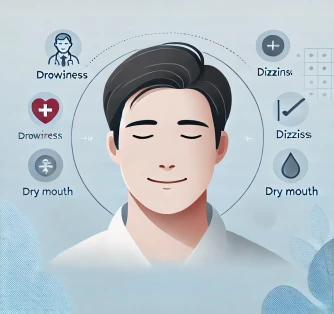Menu
Weight loss
Hormones
Sex
EXPLORE
MEET NU IMAGE MEDICAL
TREATMENTS
MEET NU IMAGE MEDICAL
TREATMENTS
MEET NU IMAGE MEDICAL
3 Common Side Effects of Trazodone—How to Handle Them


Trazodone is widely prescribed for treating insomnia. In low doses, trazodone is known to help increase the availability of serotonin, a neurotransmitter that stabilizes mood and promotes sleep. This makes it an effective solution for those struggling with sleepless nights. While trazodone is generally well-tolerated, some users may experience side effects.
Understanding these side effects and knowing how to manage them can make your experience with trazodone smoother and more comfortable. In this article, we’ll explore three of the most common side effects of trazodone, particularly when used as a sleep aid and provide practical tips on how to handle them.
1. Drowsiness - Trazodone side effect
One of the most common side effects of trazodone is drowsiness. This effect occurs because trazodone has sedative properties, which is why it is often prescribed to help with sleep disorders. While this can be beneficial for those struggling with insomnia, it can be a challenge for individuals taking trazodone for depression who need to remain alert during the day.
How to handle it
-
Take trazodone at night: If possible, take trazodone before bedtime to take advantage of its sedative effects during sleep.
-
Adjust your schedule: Plan your activities around your medication schedule, ensuring that tasks requiring high alertness are done before taking trazodone.
-
Consult your doctor: If drowsiness is too severe, consult your healthcare provider. They may adjust your dose or recommend taking the medication at a different time.
2. Dizziness - Trazodone side effect
Dizziness is another common side effect of trazodone, particularly when standing up quickly or after changing positions. This occurs because trazodone can cause a drop in blood pressure, leading to feelings of lightheadedness or dizziness.
According to a detailed overview on WebMD, dizziness is a frequent side effect, particularly in the initial stages of treatment or when the dosage is increased.
How to handle it
-
Stand up slowly: Avoid sudden movements, especially when rising from a seated or lying position. Stand up slowly to give your body time to adjust.
-
Stay hydrated: Dehydration can exacerbate dizziness, so ensure you’re drinking enough water throughout the day.
-
Monitor your blood pressure: If dizziness persists, consider checking your blood pressure regularly and discuss any concerns with your healthcare provider.
3. Dry mouth - Trazodone side effect
Dry mouth is a frequent complaint among trazodone users. This side effect occurs because trazodone can reduce saliva production, leading to a dry, uncomfortable mouth. GoodRx explains how certain medications, including trazodone, can lead to dry mouth by affecting the salivary glands.
A discussion on Reddit also highlights how users often seek advice on managing this uncomfortable side effect, showcasing the commonality of dry mouth with trazodone use.
How to handle it
-
Stay hydrated: Drink plenty of water throughout the day to keep your mouth moist.
-
Use saliva substitutes: Over-the-counter saliva substitutes can help alleviate the discomfort of dry mouth.
-
Chew sugar-free gum: Chewing gum or sucking on sugar-free candy can stimulate saliva production and provide relief.
In conclusion, while trazodone is an effective medication for many people, it can come with side effects like drowsiness, dizziness, and dry mouth. These side effects, although common, can often be managed with simple strategies. By understanding how to handle these side effects, you can make your trazodone experience more comfortable and continue benefiting from its therapeutic effects. If you encounter persistent or severe side effects, always consult with your healthcare provider for further advice.
Ready to manage your trazodone side effects effectively?
Learn more about how to use trazodone safely with guidance from Nu Image Medical.
This article is for informational purposes only and does not constitute medical advice. The information contained herein is not a substitute for and should never be relied upon for professional medical advice. Always talk to your physician about the risks and benefits of any treatment. Nu Image Medical may not offer the medications or services mentioned in this article.
